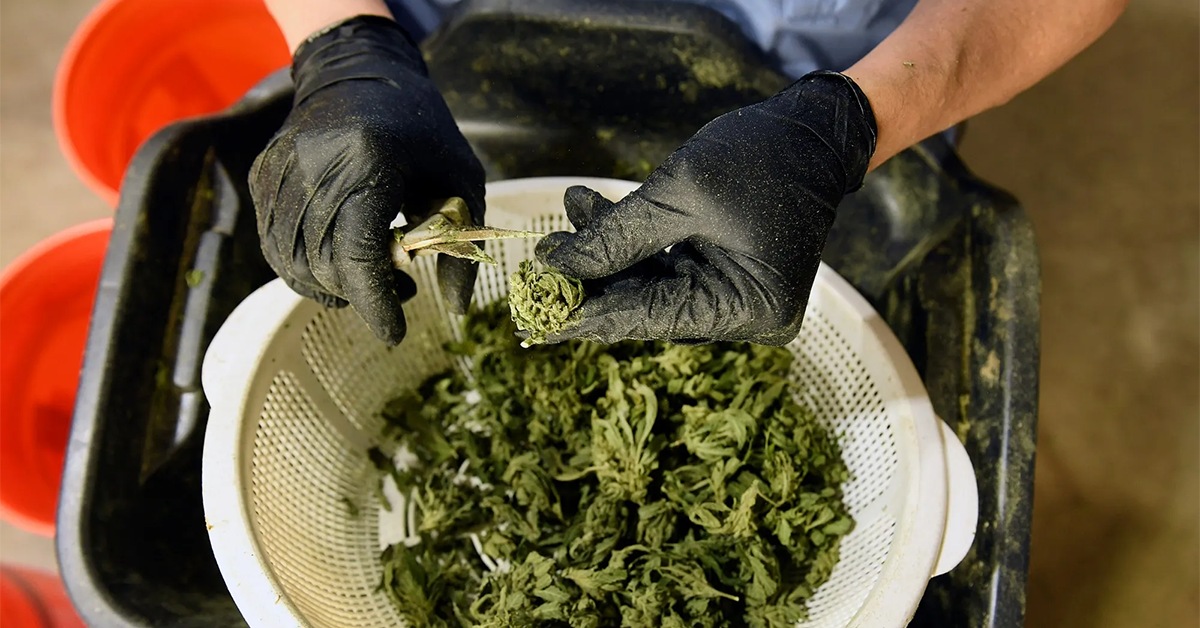The Symphony of Cannabinoids: Understanding TAC in Cannabis Usage

In the dynamic discourse surrounding cannabis, a term that is often overshadowed yet holds critical significance is Total Active Cannabinoids, or TAC. This term serves as a comprehensive indicator of the potency and diversity of cannabinoids in a cannabis product, providing users with a holistic understanding of their experience.
TAC is pivotal in the context of the ever-growing conversation around cannabis. It doesn't merely denote the presence of individual cannabinoids such as THC (Tetrahydrocannabinol) and CBD (Cannabidiol) but encapsulates the entire array of active cannabinoids. TAC offers an aggregate measure that enlightens users on the potential range of effects, therapeutic advantages, and flavor profiles of their chosen cannabis products.
Cannabidiol (CBD) is a prominent cannabinoid, known for its therapeutic properties and non-psychoactive nature. It provides relief from ailments such as chronic pain, anxiety, and epilepsy, making it an essential component of the TAC.
Cannabigerol (CBG), albeit found in smaller amounts, is regarded as the "stem cell" of cannabinoids. It acts as a precursor for other cannabinoids and is crucial to the plant's biology. Its potential health benefits include antibacterial properties and a role in cancer treatment and glaucoma management.
Cannabinol (CBN) evolves from aged THC and has mild psychoactive properties. It stands out for its sedative attributes, making it valuable for individuals seeking restful sleep.
Cannabichromene (CBC), though often overlooked, is believed to possess benefits such as anti-inflammatory and antidepressant properties without contributing to the psychoactive high.
Cannabidivarin (CBDV), closely related to CBD, is being explored for its potential in treating neurological conditions, adding a subtle yet crucial element to the TAC.
TAC is more than just a numerical measure; it narrates the diverse capabilities of the cannabis plant. Acknowledging TAC leads to a deeper comprehension of the plant's complexity and facilitates a more informed choice for both recreational and medicinal users.
The allure of cannabis extends beyond the pursuit of a high. Understanding TAC is crucial as it guides users to an enriched experience that encompasses pain relief, relaxation, creativity, and focus. The "Entourage Effect" emphasizes the synergistic interaction of cannabinoids, terpenes, and flavonoids, enhancing the overall cannabis experience.
Relation and Differences Between TAC & THC
While THC has been the primary focus due to its psychoactive effects, TAC provides a broader perspective, reminding users of the multitude of active compounds present. TAC and THC together create a harmonious interaction, producing varied effects and experiences.
TAC Accuracy
Ensuring the accuracy of TAC is vital in a market flooded with diverse cannabis products. Purchasing from credible sources that provide third-party lab testing and Certificates of Analysis (COA) is crucial for ensuring product quality and consumer safety.
Concluding Thoughts
It's important to recognize that cannabis can interact with medications, potentially leading to side effects. Therefore, consulting a healthcare professional is recommended before combining cannabis with other treatments. A comprehensive understanding of TAC is essential for ensuring safe and effective use.
Cannabis is akin to a symphony, with each cannabinoid playing a distinct role. Prioritizing TAC allows users to fully appreciate the collective performance of these compounds. However, the pursuit of the ideal cannabis experience extends beyond knowledge; it involves trust in the products and suppliers. Accurate TAC labeling is crucial, emphasizing the need for reliable and transparent vendors.
As our understanding of cannabis evolves, TAC emerges as a pivotal chapter in the narrative of cannabis connoisseurship. It's not merely a statistic but a story, where users are the authors, protagonists, and critics. By making informed choices and understanding the nuances of TAC, users can fully immerse themselves in the enriching journey that cannabis offers.
Trial Looms for Man Accused of Dragging State Trooper in Jackson Traffic Stop

In a recent incident that has captured the attention of Michigan's cannabis community, a Detroit resident is set to face trial after a dramatic confrontation with a Michigan State Police trooper in Jackson. The events unfolded on September 24th, when Tavion William Beasley, a 21-year-old man, was pulled over during a routine traffic stop that escalated into a high-stakes situation.
Court documents indicate that Beasley is currently facing multiple felony charges, including assault with intent to murder, carrying a concealed weapon, third-degree fleeing police, resisting arrest causing injury, and felony firearms. These charges have been brought forward after an in-depth examination of the circumstances surrounding the traffic stop.
On the morning in question, at approximately 9 a.m., a trooper observed a maroon Chrysler 300 traveling at an alarming speed of 92 mph on U.S. 127. The car was subsequently pulled over on South Street near Michigan Avenue. The incident, captured on a body camera video, reveals the tension that quickly escalated during the interaction.
Upon approaching the vehicle, the trooper requested Beasley's driver's license, registration, and insurance. The trooper quickly noticed the scent of burning marijuana inside the car and instructed Beasley to exit the vehicle. Beasley acknowledged the presence of marijuana and initially complied with the trooper's instructions. However, the situation took a turn when Beasley, while conversing on his cell phone, returned to his car despite the trooper's orders.
The body camera footage shows the ensuing chaos as Beasley sped away with the trooper still partially inside the vehicle, pleading for him to stop. The trooper clung to the car for a perilous 41 seconds before Beasley stopped to let her out and then sped off again. The dislodged body camera continued to record from inside the car, capturing Beasley's frantic conversation admitting to pushing the trooper out.
The trooper sustained minor injuries and was treated at Henry Ford Jackson Hospital before being released. Beasley, after being identified as a suspect, turned himself in following discussions with his family, who encouraged him to cooperate with the authorities.
The trial is set to take place in the Jackson County Circuit Court, presided over by Judge Thomas Wilson. Beasley's bond has been set at $500,000, and he remains in custody at the Jackson County Jail.
While this incident echoes a similar case previously reported in Jackson County's Summit Township, it brings to light the ongoing discussions surrounding the responsible use of marijuana and the challenges faced by law enforcement. The case underscores the need for clear understanding and adherence to the laws governing cannabis use while driving and emphasizes the potential consequences of neglecting such responsibilities.
Navigating Growth and Challenges in Michigan's Cannabis Industry

In the face of market obstacles, Michigan's cannabis industry is gearing up for growth. A recent study titled "2023 Michigan Cannabis CFO Outlook" revealed that 25% of the state's cannabis enterprises are actively pursuing funds to broaden their operations, with an additional 45% intending to do so within the coming year.
The research, conducted by A&K Research and employed by Rehman Business Consulting, encompassed a variety of cannabis businesses, with revenues spanning from $5 million to over $100 million. A significant 47% of the respondents identified as vertically integrated companies.
The findings suggest that the average annual revenue per cannabis storefront in Michigan falls between $1 million and $3 million. However, the era of rampant mergers seems to be waning, as a mere 22% of respondents indicated a likelihood of finalizing an acquisition in the forthcoming year. Conversely, 61% of companies disclosed that they were unlikely to close any acquisitions in the same period.
A noteworthy 66% of Chief Financial Officers (CFOs) surveyed expressed no intention of selling their respective businesses. On the flip side, 17% are actively seeking an exit, while an identical 17% are contemplating a sale. Interestingly, the anticipated selling price for companies has seen a decline since 2022; while 44% of respondents believed they could fetch a selling price equating to 4x-5x EBITDA then, over half in 2023 have adjusted their expectations to a more modest 2x-4x.
Taxation is a prominent concern for Michigan cannabis operators, with respondents citing an effective tax rate of 41% or higher in 2023. Surprisingly, 53% claimed not to be utilizing any state or local tax exemptions. The interest rates faced by these companies vary considerably. While a fortunate 18% reported having no debt, and 24% indicated an interest rate below 7%, there were also 18% who reported rates of 10-12%, and a further 24% facing hefty rates of 16% or above.
When it comes to employee benefits, the majority of cannabis business owners in Michigan seem reluctant to distribute company equity, with 71% not offering equity grants to their staff. Furthermore, less than half of the companies surveyed cover at least 50% of their employees' healthcare costs.
Despite the challenges, Michigan's cannabis entrepreneurs remain optimistic. Nearly half anticipate market prices stabilizing in the next one to three years. Nonetheless, a substantial 32% conceded uncertainty, expressing no clear expectations regarding when the market will find its footing.
Exploring Traffic Safety in the Era of Legal Cannabis: Michigan Impaired Driving Summit

The increasing acceptance and legalization of recreational cannabis have brought forth unique challenges in traffic safety and law enforcement. To address these concerns, a pivotal event is scheduled for those keen on understanding and navigating the intricacies of this evolving landscape. The 2023 Michigan Impaired Driving Summit, organized by AAA Michigan and the State of Michigan Office of Highway Safety Planning, aims to foster a constructive dialogue surrounding these issues.
The summit is set to take place on Wednesday, November 8, from 7:30 am to 4:30 pm EST. The venue chosen for this engaging discussion is the Crowne Plaza Lansing West, an IHG Hotel, located at 925 South Creyts Road, Lansing, MI 48917.
A Glimpse into the Day's Itinerary
The event will commence with a Registration/Check-In and Networking session from 7:15 am to 8:15 am, giving attendees an opportunity to connect before the main agenda begins.
From 8:30 am to 4:30 pm, the summit will delve into a dynamic, full-day agenda. The organizers have invited national impaired driving experts to join AAA and the State of Michigan's Office of Highway Safety Planning in a comprehensive, statewide conversation. The dialogue will focus on the challenges and nuances of traffic safety and law enforcement, especially in light of the recreational use of cannabis in Michigan.
It's important to note that this event is designed for in-person participation only, with no provision for virtual access.
Catering to Attendee Needs
To ensure a comfortable experience, refreshments and lunch will be provided to all participants. Moreover, attendees seeking accommodation have an opportunity to avail of a small block of discounted rooms at the Crowne Plaza Lansing West. These rooms are available on a first-come, first-serve basis.
Reservation Details
For those interested in securing a room, reservations can be made directly by identifying oneself as a MI Impaired Driving Summit attendee. Reservations can be initiated by calling the hotel at (877) 322-5544. Alternatively, online reservations can also be processed by visiting Crowne Plaza Lansing West and using the Group Code AAA while specifying the check-in and check-out dates.
Guests have the flexibility to cancel their reservations up until 4:00 p.m. EST the day before arrival. Failure to cancel in time will result in a charge equivalent to one night's stay, along with applicable taxes.
Conclusion
The 2023 Michigan Impaired Driving Summit promises to be an enlightening and necessary dialogue for stakeholders interested in the crossroads of traffic safety and cannabis legalization. It offers an invaluable opportunity to stay informed, network, and actively participate in shaping the future of safe driving practices in Michigan.
House of Dank Strengthens Support for Breast Cancer Awareness This October

While October is drawing to a close, we recently came across this commendable initiative and felt it was essential to spotlight the positive actions being taken in our community.
In observance of October's designation as Breast Cancer Awareness Month, the Michigan-based cannabis retailer, House of Dank (H.O.D.), is reaffirming their dedication to making a positive mark in the community. For the second consecutive year, H.O.D. is pledging to allocate a portion of their proceeds, collected every Wednesday from all nine retail locations, to bolster awareness initiatives of the month. Additionally, the full earnings from the sales of their custom H.O.D. x D.R.F. t-shirts will be channeled to the Dianna Rasha Foundation (D.R.F.).
The previous year witnessed H.O.D. making a noteworthy donation of $10,000 to the D.R.F. This is emblematic of their persistent endeavors to back institutions that focus on enhancing the lives of those grappling with breast cancer, with an emphasis on supporting young women navigating this daunting path.
Available both in-store and online across all H.O.D. locations, the H.O.D. x D.R.F. Faith Short Sleeve Tees are priced at $20. It's worth noting that every cent from the sale of these t-shirts will find its way to D.R.F.
Marvin Jamo, the proprietor of House of Dank, expressed, "The impact of breast cancer extends to countless women and their families. It's imperative that we consistently back foundations like the Dianna Rasha Foundation, which devote themselves to elevating the lives of those afflicted. Our donations are more than mere symbols of support; they represent hope and a tangible contribution to the wellbeing of myriad community members."
The Dianna Rasha Foundation stands out for its commitment to supporting young women currently undergoing breast cancer treatment. Their mission is to offer these women the resources to lead a quality life without the financial strains, infusing them with hope, love, and the zest for life.
To culminate their month-long drive, House of Dank is set to host an official check presentation ceremony to the D.R.F. The event, the date for which is yet to be finalized, will be held at their principal location on 8 Mile.
A Glimpse into the Dianna Rasha Foundation
Established as a tribute to Dianna, the Dianna Rasha Foundation aims to mirror the zeal with which Dianna led her life. Their primary goal is to furnish services that mitigate the psychological and emotional stresses faced by young women with breast cancer. By doing so, the foundation strives to ensure that these women can embrace their life with the same vigor and charm that Dianna embodied during her battle.
The Positive Impact of Cannabis Retail on Michigan's Communities

Cannabis legalization is a topic that has occupied debates and discussions for many years. The state of Michigan stands at a crossroads, where understanding the history, nuances, and current data can guide informed decisions for the betterment of its communities. With an in-depth look, the advantages of embracing retail cannabis become unmistakably evident.
Local Economic Boost through Cannabis Retailers
Cannabis retailers are more than just outlets; they're integral small businesses. These establishments operate similarly to any other retail store, accepting both cash and debit card payments. Their collaboration with local banks and credit unions not only encourages financial growth but also boosts the circulation of money within the community. This symbiotic relationship aids in reinforcing the local economy.
Safety, Regulation, and Community Welfare
The safety of Michigan's residents remains a primary concern. Retail cannabis outlets uphold rigorous standards, necessitating a valid ID for adults 21 and above. Furthermore, Michigan state ensures a thorough monitoring process, overseeing every product right from its growth phase to its sale. This meticulous oversight surpasses even that of many local liquor stores, safeguarding the younger generation and the broader community.
Debunking Crime Myths
Contrary to some critics' beliefs, there's no evidence linking the rise of cannabis retailers to an uptick in crime. Comprehensive data from numerous Michigan communities indicate that crime rates have remained consistent despite the influx of cannabis retail establishments. These statistics underscore the potential of a harmonious coexistence between cannabis retailers and their surrounding communities when proper regulations are in place.
An Investment in Education and Infrastructure
2023 saw a remarkable contribution from the Marihuana Regulation Fund. A sum of $59.5 million was allocated to 224 municipalities and counties. Moreover, both the School Aid Fund for K-12 education and the Michigan Transportation Fund received a substantial $69.4 million each. Such considerable funds underscore the potential financial boost that communities could receive by welcoming cannabis retail ventures.
Community Financial Advantages and Employment Opportunities
Michigan communities that give the green light to cannabis retail can expect an influx of over $50,000 annually from every licensed cannabis outlet. Beyond this, the Community Benefits programs, initiated by retailers and their affiliated organizations, pledge annual donations for public utilities, parks, and community welfare schemes. Collaborations between retailers and non-profit organizations have also burgeoned, fostering charitable contributions, volunteering, and fundraising endeavors.
The introduction of cannabis retailers is synonymous with local job creation, offering employment avenues without unduly straining the city's infrastructure or traffic flow.
Addressing Historic Social Injustices
Historically, the narrative around cannabis has been tainted by racial and societal prejudices, with the 1937 ban being a stark reminder. By championing cannabis initiatives, communities are not only bolstering economic growth but also mending long-standing social disparities. Over the years, racial inequalities have persisted, using cannabis prohibition as an instrument. Correcting this wrong is long overdue.
A Bright Future with Cannabis
Embracing the cannabis industry in Michigan translates to dismantling outdated misapprehensions and recognizing its numerous benefits. This sector has already showcased its positive influence on Michigan's economy. To truly harness its potential, it's crucial to eradicate the stigmas around this well-regulated commodity. By doing so, Michigan can ensure economic prosperity and promote inclusivity and equity for all its residents. The time has come to focus on the future and appreciate the immense promise this burgeoning industry holds for Michigan's economic landscape and the well-being of its communities.


 Helpful Links
Helpful Links